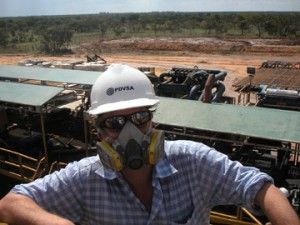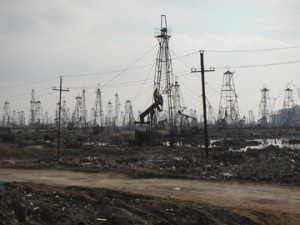EVEN MORE INCONVENIENT: ‘A CRUDE AWAKENING’
“Energy is the most pressing issue. If you have clean abundant energy, you can solve all today’s problems: You can turn the Sahara into a garden, you can desalinate salt water, you can pump it wherever you want to have it. Cheap energy can develop the world. A barrel of oil — one hundred and fifty-nine liters — contains the physical capacity of what twelve men would have to work for over a year. It’s really the key to our time.”
This is Basil Gelpke, and that’s the optimistic part. Here’s the flip side: Our global civilization is dependent on one particular energy source, and if we run out of it we’re in trouble. That time might be soon. It might be now.
Gelpke, a TV (NZZ Format) and print journalist based in Zurich, is a self-professed conservative (“with a small ‘c’”). He is also the director of A Crude Awakening: The Oil Crash, and even though the film is creating something of a storm in international eco-circles, Gelpke actually didn’t set out to make a “green movie”.
“Being a good Swiss, we’re always interested in commodity prices. So I was reading a paper by an Australian hedge fund — people who work with George Soros — and they were trying to find out how much fossil fuel was left in total. They couldn’t come to a clear conclusion. Eventually, they gave a figure of [an amount which would last] roughly forty years, and if you have children, it doesn’t seem like such a long time.”
Gelpke launched into an investigation . “In retrospect it seems like a very naive question, ‘how much of this stuff is left?’ because there are no hard answers. And that’s how the film came about; I find this to be the most under reported story. Even if there is a ten percent possibility of us being right—it has implications that are so far reaching.”
He joined forces with Irish film maker Ray McCormack and LA based Swiss film maker Reto Caduff.
“I really have to give credit to Basil for tapping into the zeitgeist” says Caduff, who filmed the U.S interviews and footage and brought a vintage/retro sensibility to the table. “When we started, there was no discussion about this; oil was still $38 a gallon. Now we’re completely blown away by the momentum”. The zeitgeist in question is the head rush from An Inconvenient Truth, Al Gore’s global warming vehicle, which made everyone perk up. Crude Awakening comes hot on the heels of the global warming movie (they were in the works at about the same time). And while the comparisons are unavoidable, Gelpke nods aesthetically in another direction:
“I’m very sympathetic to Koyaanisqatsi and this sense of speeding things up. Looking back at our lives in the last ten years, we’ve all increased our mobility.” Koyaanisqatsi is the first of Godfrey Reggio’s cinematic “Qatsi” trilogy depicting the world off-kilter and in a crisis through formally beautiful epic montage of nature, industrial waste and destruction, replete with a wall-to-wall Phillip Glass score. Crude Awakening exhibits family traits with Koyaanisqatsi: hi-definition vistas, lush ominous slivers of Philip Glass, (in turn straddled by Handel, Saint-Saens, Phillip Kuhn and Stefan Faesch)— nested between Daniel Schnyder’s atmospheric score. Then other fun DNA pops up: the scenario of how we got into our current energy crisis unfolds with a quirky helping of vintage commercials/infomercials.
Most importantly, Crude Awakening is not just a pretty picture; it features an international posse of whip smart specialists and heavyweights, ranging from former OPEC Secretary General (and Iraqi Oil Minister) Fadhil Chalabi to republican Congressman Roscoe Bartlett, to Terry Lynn Karl of Stanford University; all of them articulating before the camera the shape of things to come.
Ultimately, the message of Crude Awakening is an alarming one: We’re about to run out of cheap abundant energy, and then what?
Peak oil — the idea that we are sitting on a finite mountain of fossil fuels which is just about peaking — has been debated since the 70s. What’s striking about this film is that the issue is non-partisan. Conservatives, liberals and millennialists all converge at similar conclusions.
As Gelpke notes:
“Everyone tries to glimpse at what the future is holding. I’m convinced that we have a problem in which soon supply won’t meet demand anymore at a very crucial time when the world’s two most populous nations (India and China) are rapidly industrializing and therefore really need that source of energy. We can’t replace it with anything else really—except perhaps for coal. So I think we’re headed for a crash. I might be wrong and I hope I’m wrong.”
So what’s next for him, another environmental movie?
“No! A romantic comedy! I got a bit depressed making this film— and that’s not me. I do enjoy life, I enjoy the lifestyle that comes with oil — I even like cars… I just feel there’s a huge party going on and it’s coming to an end.”
Perhaps, but in the last minutes of Crude Awakening we catch glimpses of the Amish, in their unindustrialized bubble. So maybe the party will be ending, and then we’ll have to attend the ones we used to ignore? The option is yours. Look into it.
For more about Crude Awakening visit: www.OilCrashMovie.com
All images courtesy of www.OilCrashMovie.com


